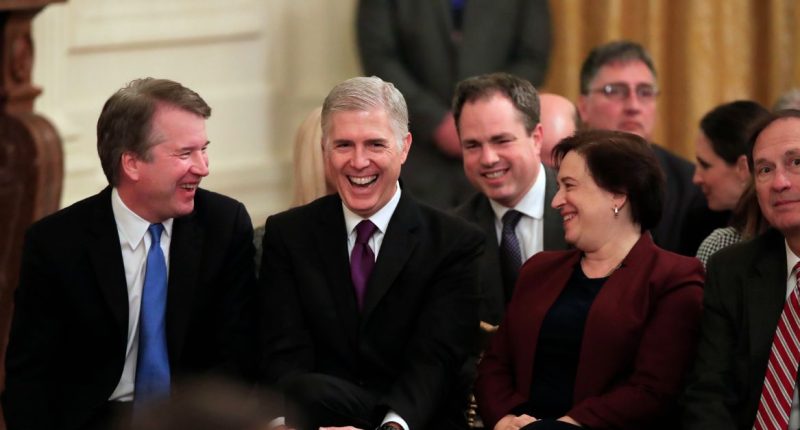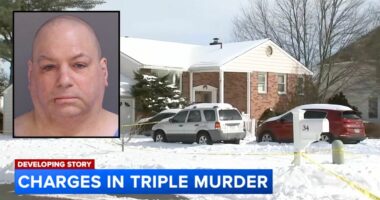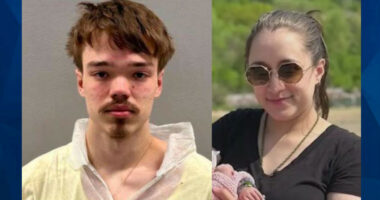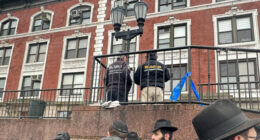Share this @internewscast.com
U.S. Supreme Court Justices, from left, Brett Kavanaugh, Neil Gorsuch, Elena Kagan, and Samuel Alito, engage in conversation with other attendees before the Presidential Medal of Freedom presentation in the East Room of the White House, Washington, Friday, Nov. 16, 2018. (AP Photo/Manuel Balce Ceneta)
Following U.S. Supreme Court Justice Neil Gorsuch’s scathing critique of a federal judge for not adhering to precedent by blocking the Trump administration’s funding cuts at the National Institutes of Health (NIH), some federal judges, both named and unnamed, are publicly airing their objections in an unusually defiant scene.
The debate largely stems from Gorsuch’s comments on Aug. 21, when SCOTUS issued an emergency order granting the government a stay against a lower court’s order to “vacate” the “termination” of almost $800 million in “various research-related grants.”
Although Justice Brett Kavanaugh provided more measured criticism, Gorsuch began his opinion in NIH v. American Public Health Association (APHA) with harsh remarks directed at district court judges generally, particularly Senior U.S. District Judge William Young, regarding the need to respect the court’s decisions often issued on the “shadow docket.”
“Lower court judges may sometimes disagree with this Court’s decisions, but they are never free to defy them,” stated Gorsuch, referencing the court’s emergency ruling in a Department of Education v. California grant case from April.
Gorsuch noted that in that instance, “this Court granted a stay since it found the government was likely to succeed in proving that the district court lacked jurisdiction to compel the government to fulfill grant obligations,” as those contractual disputes should be addressed by the U.S. Court of Federal Claims, rather than under the Administrative Procedure Act (APA) in a district court.
But according to Gorsuch, Young, “[r]ather than follow that direction […] permitted a suit involving materially identical grants to proceed to final judgment under the APA,” when he issued a June ruling that found the Trump administration’s sweeping NIH grant cuts were “arbitrary and capricious” under the APA, racially discriminatory, and discriminatory “against America’s LGBTQ community.”
“That was error,” Gorsuch said, before adding a parting shot: “[W]hen this Court issues a decision, it constitutes a precedent that commands respect in lower courts.”
As recounted by the New York Times, Young, a Reagan-appointed U.S. District Court judge in Massachusetts since 1985, heard Gorsuch loud and clear. He apologized in court on Tuesday directly to Gorsuch and Kavanaugh and said he never intended to defy SCOTUS.
“Before we do anything, I really feel it’s incumbent upon me to — on the record here — to apologize to Justices Gorsuch and Kavanaugh if they think that anything this court has done has been done in defiance of a precedential action of the Supreme Court of the United States,” Young reportedly said.
“I have served in judicial office now for over 47 years,” the judge added, according to the Times. “Never before this admonition has any judge in any higher court ever thought to suggest that this court had defied the precedent of a higher court — that was never my intention.”
Young reportedly said that he stood “corrected” and that he “simply did not understand that orders on the emergency docket were precedent,” again alluding to “shadow docket” rulings — the implications of which are not necessarily clear to even veteran lower court judges like Young.
The apology was rare and remarkable in itself, but what has followed is just as — if not more — unusual.
On Wednesday, one day after Young’s apology, another federal judge in Massachusetts struck down the Trump administration’s $2 billion research grant freeze as illegal and retaliatory, a win so far for Harvard University.
In the ruling, U.S. District Judge Allison D. Burroughs, a Barack Obama appointee, noticeably responded at length to Gorsuch’s criticism in a footnote, calling the justice’s remarks “unhelpful and unnecessary” in light of the realities at play.
“The Court is mindful of Justice Gorsuch’s comments in his opinion in APHA and fully agrees that this Court is not free to ‘defy’ Supreme Court decisions and is, in fact, ‘duty-bound to respect ‘the hierarchy of the federal court system,'” Burroughs began. Consistent with these obligations, this Court (and likely all district courts) endeavors to follow the Supreme Court’s rulings, ‘no matter how misguided [it] may think [them] to be.'”
From here, Burroughs levied a criticism of her own, saying that SCOTUS should be clearer in its so-called “shadow docket” rulings, essentially defending Young for not seeing the Department of Education opinion as precedent for the purposes of APHA v. NIH, which dealt with a different agency.
“That said, the Supreme Court’s recent emergency docket rulings regarding grant terminations have not been models of clarity, and have left many issues unresolved,” she wrote, before suggesting that Gorsuch and SCOTUS in general are unaware of how difficult it can be to parse emergency docket rulings that sometimes don’t offer much in the way of explanation.
“This Court understands, of course, that the Supreme Court, like the district courts, is trying to resolve these issues quickly, often on an emergency basis, and that the issues are complex and evolving,” Burroughs went on. “Given this, however, the Court respectfully submits that it is unhelpful and unnecessary to criticize district courts for ‘defy[ing]’ the Supreme Court when they are working to find the right answer in a rapidly evolving doctrinal landscape, where they must grapple with both existing precedent and interim guidance from the Supreme Court that appears to set that precedent aside without much explanation or consensus.”
Now, the morning after Burroughs’ retort, at least 10 anonymous federal judges, appointed by Republican and Democratic presidents, have joined the chorus pushing back on the high court’s “shadow docket” practices in an extensive article by NBC News’ Lawrence Hurley.
The judges’ overall response highlighted a seemingly troubling dynamic. In a threat-filled climate where the Trump administration files ethics complaints, calls for impeachment, or otherwise discredits judges who rule against them, SCOTUS’ frequent emergency relief for the government creates additional problems. These terse rulings, lacking reasoning and clarity, leave lower courts in the lurch and feed criticism that judges are simply biased against President Donald Trump.
From the article:
Ten of the 12 judges who spoke to NBC News said the Supreme Court should better explain those rulings, noting that the terse decisions leave lower court judges with little guidance for how to proceed. But they also have a new and concerning effect, the judges said, validating the Trump administration’s criticisms. A short rebuttal from the Supreme Court, they argue, makes it seem like they did shoddy work and are biased against Trump.
“It is inexcusable,” a judge said of the Supreme Court justices. “They don’t have our backs.”
A judge was also quoted as saying a spate of scantly explained emergency rulings going in the Trump administration’s favor is “almost like the Supreme Court […] saying it is a ‘judicial coup.'”
After referencing Gorsuch’s critique, the article quoted a discouraged judge who said it feels as if “[w]e are operating in a bit of a vacuum.”
Legal experts reacting to the story said it wasn’t difficult to see why the anonymous jurists feel the way that they do.
“It turns out judges facing death threats after writing 100-page opinions in high-stakes cases with our constitutional democracy at stake don’t much like being chastised for not mind-reading lawless shadow docket rulings,” remarked Columbia Law School constitutional law professor Jamal Greene.
Georgetown Law Professor Steve Vladeck commented that it was “only a matter of time before we’d see both stories like this and passages like footnote 9 in Judge Burroughs’ ruling yesterday in the Harvard case.”
“It’s one thing to be bound by #SCOTUS; it’s another thing to respect what the justices are doing. The decline of the latter is a five-alarm fire,” he said.
Calling the story a “must read,” Michigan Law Professor Leah Litman said the NBC story shows how SCOTUS is “enabling Trump’s attacks on” federal judges and “how it’s making a hash of the law on the shadow docket[.]”

















